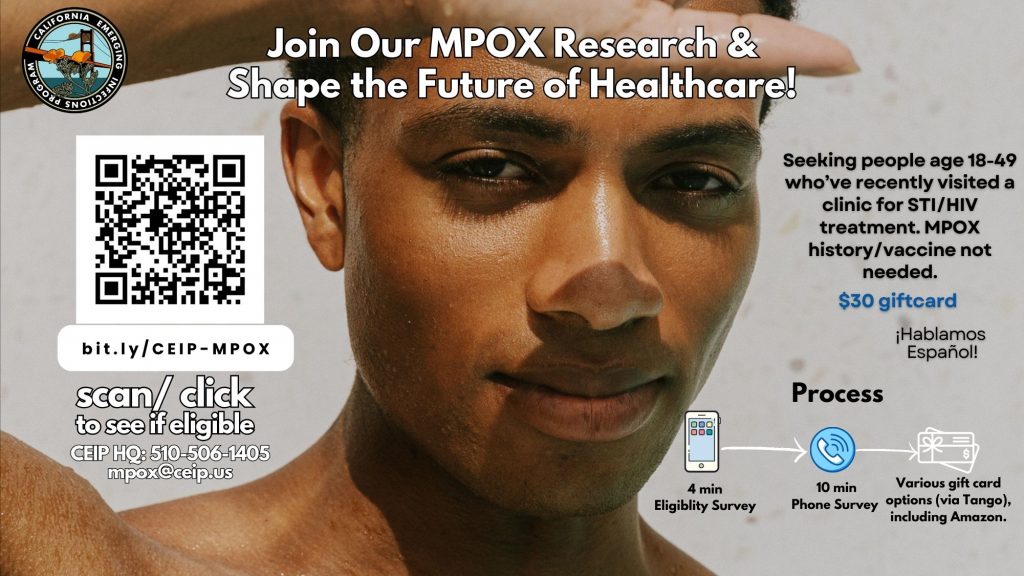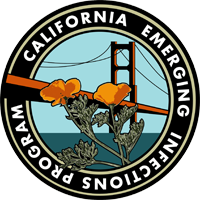
Overview
From May 17, 2022 to September 28, 2023, > 30,000 cases of confirmed or probable mpox have been reported in the United States [1]. Mpox is an orthopox virus that can be transmitted through close, sustained physical contact [2]. The current outbreak has disproportionally affected gay, bisexual, and other men who have sex with men (MSM) [3].
JYNNEOS™, the Modified Vaccinia Ankara (MVA) vaccine, was approved in 2019 for the prevention of smallpox and mpox disease in adults 18 years of age and older determined to be at high risk for smallpox or mpox.
About the Study
The California Emerging Infections Program (CEIP) is conducting a research project to evaluate how well JYNNEOS™, the Modified Vaccinia Ankara (MVA) vaccine works in preventing mpox illness and improve how we respond to outbreaks. The study is being conducted with support from the National Centers for Disease Control and Prevention (CDC), the California Department of Public Health (CDPH), and local health jurisdictions.
Objectives
- To estimate the effectiveness of JYNNEOS mpox vaccine in preventing laboratory-confirmed or probable symptomatic mpox infection among adult (≥18–49 years) gay, bisexual, other MSM
- To estimate vaccine effectiveness by other factors of public health importance (route of administration (subcutaneously vs. intradermally), number of doses, timing of doses (e.g., post-exposure prophylaxis [PEP]), age groups, immunocompromised status, clinical endpoints)
- To estimate duration of the effectiveness of JYNNEOS mpox vaccine
Case & Control Definitions
Case: Demonstration of the presence of mpox virus DNA by polymerase chain reaction testing or Next-Generation sequencing of a clinical specimen OR isolation of mpox virus in culture from a clinical specimen
Control: Individuals with clinic visit dates that match case symptom onset.
Inclusion requirements
- Identifies as gay, bisexual, other MSM
- Aged 18-49 years
- Cases must have symptomatic confirmed or probable monkeypox infection with known approximate date of illness onset on or after August 19th, 2022
- 1 or more sexual partners within the 3 months prior to symptom onset (cases) or date of clinic visit (control)
- Must have a mobile phone for SMS communications or access to the internet, email, or phone
Publications
For questions about the study, please contact:
Anita Ogayemi-Agoh, MPH
Project Coordinator, MP0X
(510) 406-0914, mpox@ceip.us
Joelle Nadle, MPH
Associate Director
info@ceip.us
Additional Resources
Where to get vaccinated

Mpox vaccines may be available at your local health department, public health clinic, or hospital. In other areas, mpox vaccines may only be available from the health department. Here are some ways to find vaccines available near you:
- Contact your healthcare provider or occupational health department if you are eligible for the mpox vaccine.
- Contact your local health department to see what the vaccinations options are in your community. You can use NACCHO’s Directory of Local Health Departments to look up the contact info for your local health department.
- Use this CDC Vaccine Locator to find an mpox vaccine site near you.
- Schedule an mpox vaccine appointment through My Turn – California Vaccine Scheduling & Notifications
Centers for Disease Control and Prevent MPOX Vaccine Recommendations
East Bay Getting to Zero- MPOX page
Alameda County Public Health Department (acphd.org)
Sexualhealth@acgov.org, Attention Eileen Dunne, potential interest in the mpox case-control study.
Contra Costa County
Public Health :: Contra Costa Health Services (cchealth.org)
Contact CCHS :: Contra Costa Health Services :: Contra Costa Health Services (cchealth.org)
925-313- 6740 (general)
San Francisco County
Department of Public Health | San Francisco (sf.gov)
415-554-2500 (general)
Sources
- Centers for Disease Control 2022 Monkeypox Outbreak Cases and Data: https://www.cdc.gov/poxvirus/monkeypox/response/2022/index.html
- Centers for Disease Control 2022 Monkeypox, How it Spreads: https://www.cdc.gov/poxvirus/monkeypox/if-sick/transmission.html
- Philpott D, Hughes CM, Alroy KA, Kerins JL, Pavlick J, Asbel L, Crawley A, Newman AP, Spencer H, Feldpausch A, Cogswell K, Davis KR, Chen J, Henderson T, Murphy K, Barnes M, Hopkins B, Fill MA, Mangla AT, Perella D, Barnes A, Hughes S, Griffith J, Berns AL, Milroy L, Blake H, Sievers MM, Marzan-Rodriguez M, Tori M, Black SR, Kopping E, Ruberto I, Maxted A, Sharma A, Tarter K, Jones SA, White B, Chatelain R, Russo M, Gillani S, Bornstein E, White SL, Johnson SA, Ortega E, Saathoff-Huber L, Syed A, Wills A, Anderson BJ, Oster AM, Christie A, McQuiston J, McCollum AM, Rao AK, Negrón ME; CDC Multinational Monkeypox Response Team. Epidemiologic and Clinical Characteristics of Monkeypox Cases – United States, May 17-July 22, 2022. MMWR Morb Mortal Wkly Rep. 2022 Aug 12;71(32):1018-1022. doi: 10.15585/mmwr.mm7132e3. PMID: 35951487; PMCID: PMC9400536. https://www.cdc.gov/mmwr/volumes/71/wr/mm7132e3.htm
- Monkeypox Update: FDA Authorizes Emergency Use of JYNNEOS Vaccine to Increase Vaccine Supply | FDA: https://www.fda.gov/news-events/press-announcements/monkeypox-update-fda-authorizes-emergency-use-jynneos-vaccine-increase-vaccine-supply
- Centers for Disease Control 2022 Monkeypox Vaccination Basics https://www.cdc.gov/poxvirus/monkeypox/vaccines/vaccine-basics.html
